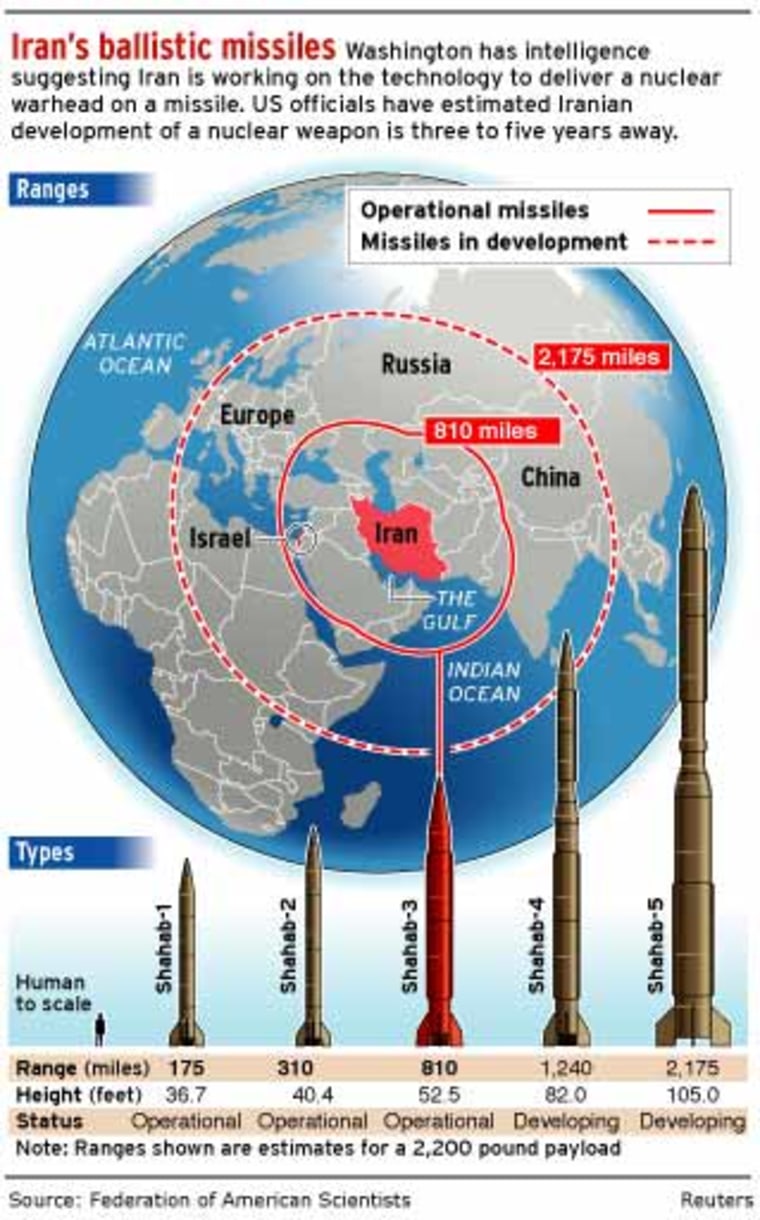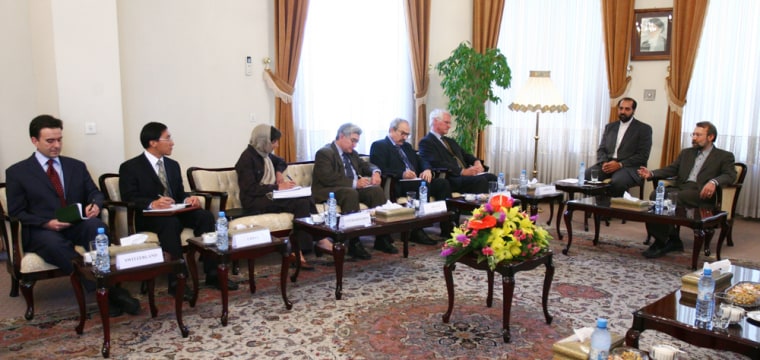The Bush administration said Wednesday a proposal by Iran for nuclear negotiations falls short of U.N. demands that it cease uranium enrichment, and the U.S. began plotting unspecified “next moves” with other governments.
Those could include U.N. sanctions against Iran unless it reverses course and agrees to a verifiable halt to enrichment activities that can be central to making nuclear weapons.
The State Department, in a terse statement, acknowledged that Iran considered its proposal to be a serious one. “We will review it,” the statement said in what appeared to be a conciliatory gesture to a government it regularly denounces as a sponsor of terror.
Another deadline looms
But the statement went on to say that Iran’s response to a joint offer of U.S., and European trade and other benefits if the enrichment program was halted “falls short of the conditions set by the Security Council” — full and verifiable suspension of all uranium-enrichment activity.
“We are consulting closely, including with other members of the Security Council, on next steps,” it said. The United Nations has set a deadline of next Thursday for a formal reply by Tehran.
President Bush met with Secretary of State Condoleezza Rice at the White House and then discussed Iran’s proposal in a telephone call with U.N. Secretary-General Kofi Annan.
The call was initiated by Annan, White House spokeswoman Dana Perino said.

The administration has cautioned Iran that it will seek sanctions in the Security Council if Tehran does not step enriching uranium.
Administration officials have refrained from outlining what punishment they might have in mind. It could include economic or political penalties, perhaps international curbs on trade.
Rice, meanwhile, telephoned Javier Solana, the senior European Union diplomat who oversees exchanges with Iran. No account of their conversation, nor of her meeting with the president, was provided.
By not rejecting Iran’s proposal outright, the administration indicated there may be a basis for dealing with long-held concerns that Tehran is developing nuclear weapons, an allegation the Iranians deny.
“The diplomats are continuing to look at it,” Perino said. “We’re working with our allies.”
France quick to respond
France took a firm and quick stand. Foreign Minister Philippe Douste-Blazy said Iran must suspend uranium enrichment if it wants to return to negotiations.
Russia’s foreign ministry, evidently ambivalent, said it would continue to seek a negotiated solution. And China appealed for dialogue, urging “constructive measures” by Iran and patience from the United States and its allies.
Patrick Clawson, deputy director of the Washington Institute for Near East Policy, said the administration may seek restrictions on providing Iran with dual-use technology — material that could be put to military use.
Clawson, in an interview, said that could give the United States and its allies leverage to pressure companies not to trade with Iran.
Analyst Ilan Berman, vice president for policy at the American Foreign Policy Council, said sanctions can work because Iran’s economy is vulnerable on several levels.
“But the U.N. approach is going to be tailored to be palatable to the Russians and the Chinese,” he said.
On U.S. policy, Berman said, “The problem is we are facing diminishing options and military action has to figure in there somewhere if all else fails.”
David Mack, a former U.S. diplomat who heads the Middle East Institute, said, “Whatever leverage we have on this issue we get through the collective weight of our diplomacy with other governments.”
Pressuring but not provoking
The United States can maintain its leverage with other governments by not being provocative — while at the same time “maintaining a stick in the closet,” he said.
Iran met its self-imposed deadline Tuesday for responding to the U.S.-European offer, which includes the possibility of U.S. help for civilian nuclear programs — but only if Iran stops uranium enrichment.
On Capitol Hill, meanwhile, the House Intelligence Committee issued a report that concluded Iran was a strategic threat and a country focused on developing nuclear weapons capability. It also linked Iran to Hezbollah, Hamas and other terrorist groups.
“Iran’s support of radical Islamists with weapons and money demonstrates in real terms the danger it poses to America and our allies,” said the committee’s chairman, Rep. Peter Hoekstra, R-Mich. He said Iran “will not be satisfied until it poses a threat to the entire world.”
The report also said there are gaps in the ability of U.S. intelligence agencies to keep up with developments in Iran’s nuclear program and suggested hiring more intelligence agents who speak Farsi.
